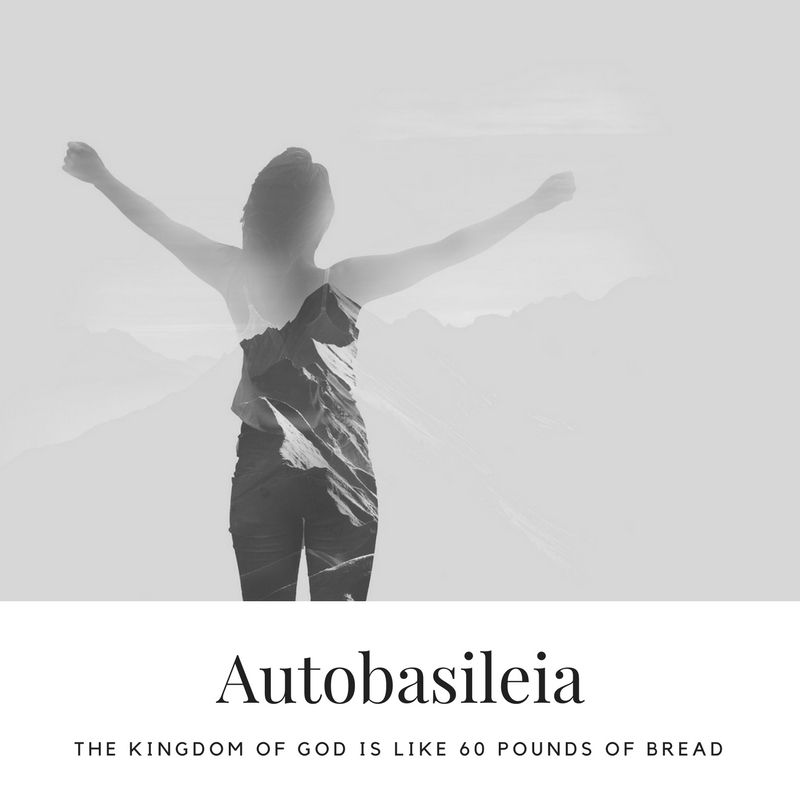
“He told them another parable: ‘The kingdom of God is like yeast that a woman took and hid in three measures of flour until all of it was leavened.”
Matt 13:33
Similar to the parable of the mustard seed, a swift read of this verse might inspire reflections on the inevitable growth of the kingdom. But there isn’t really a good reason for Jesus to give us two parables with the same meaning, which doesn’t inspire us to take any sort of action.
Again, I begin by placing these words of Jesus into context with the ancient written words of the prophets and comparing this verse to other instances when Jesus uses similar imagery.
New Testament Allusions
The phrase “three measures of flour” is important for two reasons. First, one measure is not equivalent to one cup. Actually, scholars estimate that three measures of flour would yield 40-60 pounds of dough! I did the math for you: One pound of flour yields approximately one loaf of bread, so this single woman is baking 60 individual or 5 dozen loaves of bread. Our image of a young woman baking in her home just got more interesting… The image is now one of hyberbolic extravagance, for no one woman could knead such a large amount of dough, nor could one family consume that much bread. We might be reminded of stories with similar overabundance of food, such as the wedding of Cana or the feeding of the 5,000.
Food, specifically bread, is one of Jesus’ great conceits. It begins from his day of birth, in which he slept in a manger, a feeding trough, to the Last Supper, upon which Jesus broke a loaf of bread and said to his disciples, “This is my body that is for you” (1 Corinth 11:24). By John’s gospel, Jesus himself is the Bread of Life (6:25).
Just as important as the object of leaven is the action of hiding. Many translations state the woman “mixed” the yeast into the flour, but the Greek word is “enkrypto,” meaning “to hide,” like “cryptology” or “encryption.” The same root word is used throughout the gospels, where it often references something that is hidden but should be and will be uncovered. In Luke 8:17, Jesus said, “Nothing is hidden that will not be disclosed, nor is anything secret that will not become known and come to light.” In Matthew 5:14, Jesus said, “You are the light of the world. A city built on a hill cannot be hidden.” Perhaps most important to our study, Matthew quoted Jesus as claiming: “I will open my mouth to speak in parables; I will proclaim what has been hidden from the foundation of the world” (13:35).
Old Testament Allusions
The detail about the amount of flour is additionally important because Matthew 13 is actually the second time the exact phrase, “three measures of flour,” appears in the Bible. In Genesis 18, Abraham is unexpectantly greeted by three visitors. Displaying his famous hospitality, Abraham prostrates himself before the strangers and invites them to dine with him. He tells his wife Sarah, “Quickly make ready three measures of flour, knead it, and make cakes” (Gen 18:6).
(I expect if a woman had transcribed this bit, we would not be missing the sarcastic retort about a husband asking for 60 pounds of bread for three strangers, but that’s besides the point. Abraham may have just been tired; after all, he had just finished circumcising himself and the rest of his household.)
The three visitors tell Abraham that despite their age, Sarah will bear a son. Sarah laughs in disbelief.
A second possible allusion appears in 1 Samuel 1:24. Hannah finally conceived the child for whom she prayed, Samuel, and was offering him to the temple in thanksgiving. “When she had weaned him, she took him up with her, along with a three-year-old bull, and ephah of flour, and a skin of wine. She brought him to house of the Lord at Shiloh.” An ephah is the equivalent to three measures, and the familiar images of a woman, flour, and a long-awaited son suggest this passage Jesus also had in his mind when presenting the parable.
Interpretation
The images of the woman baking with three measures of flour sent us back to the ancient scriptures. The act of hiding and Jesus’ continued use of food imagery gave us insight into how He interpreted the Old Testament. Now, we have enough dough to chew on.
The parable suggests several equally valuable ideas.
-
The kingdom needs to be nurtured.
At the time of Jesus, women were regularly compared with ovens. This has survived in the idiom: “She has a bun in the oven.” I do not think it a stretch to connect the stories of Sarah and Hannah and their pregnancies to this parable. All three are stories of miraculous, mysterious births. Perhaps the parable tells us that kingdom will come if we nurture it.
-
The kingdom is generous.
More simply, the abundance of flour and the bread it will yield may provoke reflections on charity. Perhaps the parable means to make us ponder on those who hunger while we sit satisfied, praying “Give us this day our daily bread.” The parable can lead to a re-painting of our image of heaven. Rather than extravagant rewards for my good faith, I consider, the kingdom offers a communal oven where everyone else has enough to eat.
-
The kingdom is revealing.
Whatever the woman is doing, the results will rise and come to light. She may be able to hide some yeast in a bunch of flour, but how will she ever hide the 60 pounds of bread it yields?
Whatever we bring to the Kingdom, whatever we hide in the cloak of the Lord, God will reveal it, not as it was upon its offering, but as a newly transformed revelation. We bring him whatever we can, a single meal for the homeless, a simple word of kindness to a stranger, a friendly share of an umbrella, and He reveals the power our meek offering has to feed more than we ever considered, just as God hid His divinity in the crass body of humanity and revealed His salvation in His bodily resurrection.
Flagler Intern


